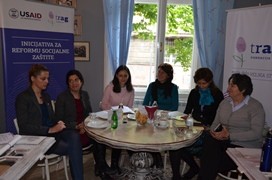
For Immediate Release
Civil society organizations (CSOs) provide nearly one-third of all local social care services in Serbia and have higher networking potential, according to the results of “Comparative study of local social service deliverers in Serbia,” presented today at restaurant “Martaan” in Belgrade. Trag Foundation conducted this study in partnership with SeCons Development Initiative Group, within Social Care Reform Initiative, which is funded by U.S. Agency for International Development (USAID).
The study maps local social service providers in Serbia, and also demonstrates the competitiveness and innovation of CSOs in providing social care services. CSOs, supported within the Social Care Reform Initiative, are working with local governments to develop new policies that better serve vulnerable groups, such as the elderly, children and persons with disabilities.
"By promoting the role of CSOs in social service reforms, we are helping marginalized people and supporting Serbia’s development of social services and inclusion that meet EU standards," said USAID/Serbia Acting Director, Democracy and Governance Office, Meral Karan.
"We are supporting initiatives that will bring positive changes to local communities as well as CSOs that will improve social services in their communities for the long term," said Trag Foundation Fundraising and Communications Director Tanja Bjelanovic.
Some of main study findings presented at the event are:
- CSOs deliver significant social care services on the local level. For example, 46% of day care providers for children with disabilities are CSOs.
- CSOs are more active in engaging volunteers. Seventy-nine percent of CSOs included in the survey have co-operation with volunteers, versus 30% in the public sector, in regards to home care service.
- CSOs are more likely to be pioneers, introducing a service to their community for the first time. For instance, Ninety-one percent of CSOs included in the survey come from municipalities in which a day care center for children with disabilities did not previously exist.
- CSOs are better equipped to provide innovative services and expand the content of services to meet the needs of their beneficiaries. Ninety-one percent of CSOs included in the survey have changed or expanded the content of services.
- CSOs provide social care services to marginalized groups in rural areas. Elderly from rural areas represent two-thirds of the beneficiaries of home care service delivered by CSOs in South and South East Serbia).
The results of the research are available online at http://www.tragfondacija.org/media/PDF/Research_Final.pdf







Comment
Make a general inquiry or suggest an improvement.